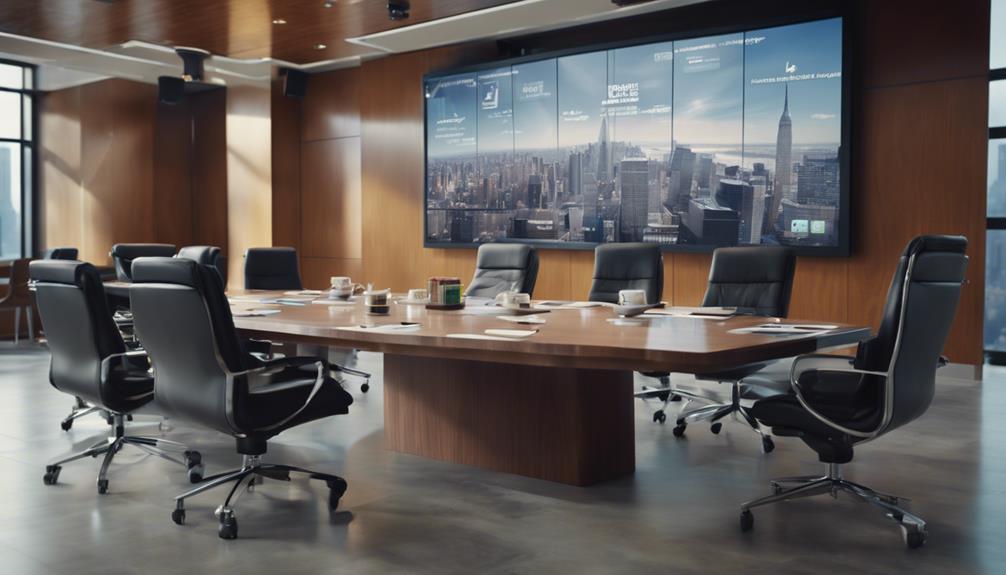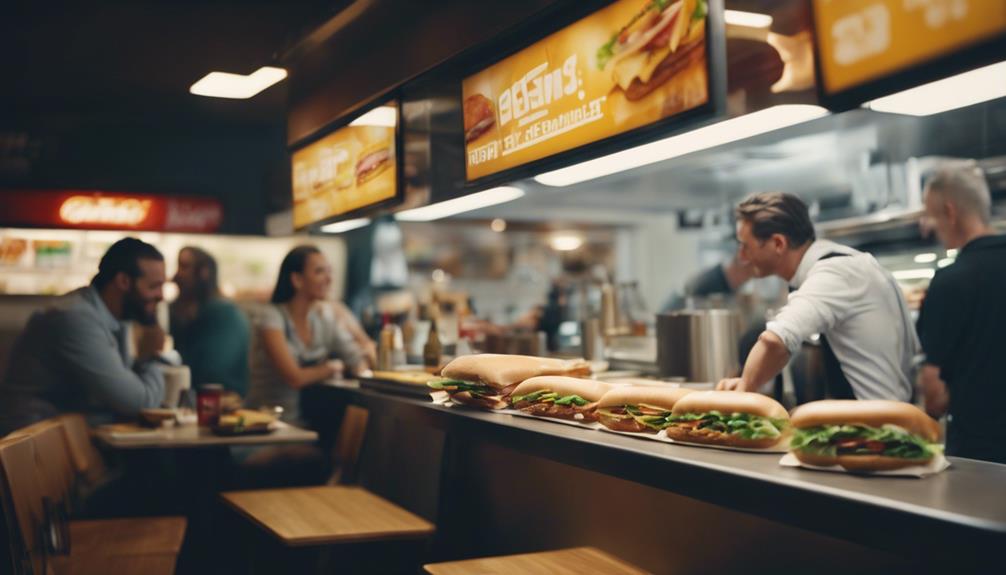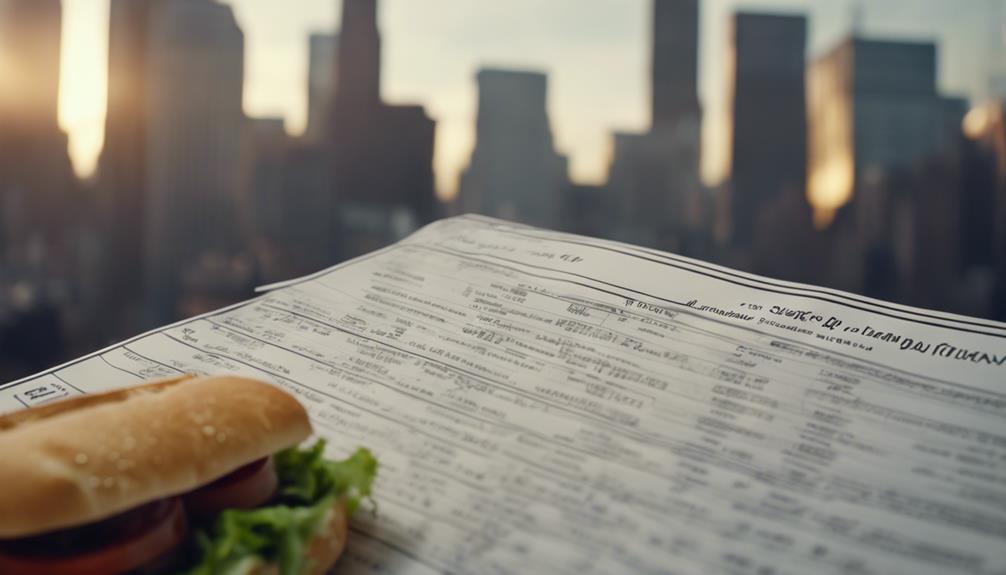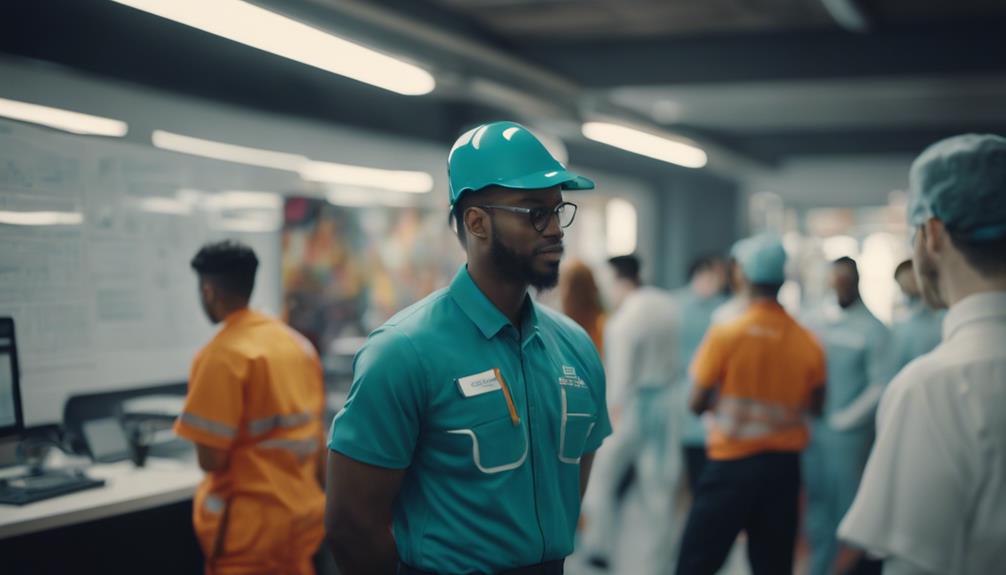Roark Capital has successfully closed its $9.6 billion acquisition of Subway, ending a prolonged negotiation period. This deal is set to rejuvenate Subway, addressing its declining franchise locations and revitalizing its brand after a drop from nearly 45,000 to around 36,000 locations. With an emphasis on improving food quality and guest experience, Roark aims to enhance customer loyalty and operational stability. The acquisition has garnered FTC approval, alleviating market dominance concerns and allowing Subway to focus on its comeback strategy. For those interested in the implications of this acquisition, more insights await exploration.
Key Elements

As Roark Capital moves forward with its acquisition of Subway, understanding the key elements becomes essential for stakeholders.
This includes a thorough overview of the company, insights into its business operations, and important information for franchisees.
Each aspect will play a significant role in shaping Subway's future under new ownership.
Company Overview
Roark Capital's acquisition of Subway marks a significant shift for the sandwich chain, which has faced challenges in maintaining its franchise locations and brand identity.
Since peaking at nearly 45,000 locations in 2016, Subway has seen a decline of about 10%, currently operating around 36,000 outlets worldwide.
This acquisition comes at a critical time, as the company aims to revitalize its brand and enhance customer experience.
With Roark's extensive portfolio, including brands like Jimmy John's and Arby's, the potential for strategic growth is evident.
Subway's leadership will remain unchanged, ensuring continuity while addressing operational hurdles.
The acquisition signals a renewed focus on improving food quality and restoring the brand's position in the competitive quick-service restaurant market.
Business Overview
What key elements define the business landscape for Subway following its acquisition by Roark Capital?
The $9.6 billion deal marks a pivotal moment for Subway, aiming to revitalize the brand after a decline in franchise locations from nearly 45,000 in 2016 to around 36,000 today.
Under Roark's ownership, Subway plans to enhance food quality and guest experience, essential for regaining customer loyalty.
Additionally, Subway retains its leadership team, ensuring continuity in operations and brand identity.
The recent FTC approval alleviated concerns about market dominance, allowing Subway to focus on its comeback strategy.
With its return to the Franchise 500 rankings, Subway's future hinges on effective execution of these initiatives in a competitive quick-service restaurant landscape.
Information for Franchisees
How will Subway's acquisition by Roark Capital impact franchisees moving forward?
The acquisition promises to bring renewed focus on improving food quality and enhancing the guest experience, which could boost sales and customer loyalty for franchisees.
With Subway's leadership remaining unchanged, franchisees can expect continuity in brand identity and operational practices.
However, challenges persist, as franchisees have faced rising operational costs and a decline in locations.
Roark's ownership may address these issues through strategic investments and marketing initiatives.
Additionally, as Subway re-enters the Franchise 500 rankings, franchisees might benefit from increased brand visibility and support.
Company Overview

Subway, founded in 1965, has evolved into a significant player in the quick-service restaurant (QSR) market, despite recent challenges.
Under CEO John Chidsey's leadership, the company remains committed to enhancing food quality while addressing its declining market share.
As Subway strategizes for growth, it focuses on revitalizing its brand and improving customer experiences.
Subway's Founding Year and Milestones
Founded in 1965, the sandwich chain has achieved numerous milestones that have shaped its journey in the fast-food industry. Initially named Pete's Super Submarines, Subway expanded rapidly, opening its first franchise in 1974.
By the 1980s, it became a household name, launching its famous “Eat Fresh” campaign in 2000, emphasizing freshness and quality. The chain reached its peak in 2016 with nearly 45,000 locations worldwide.
However, it faced challenges in subsequent years, including a decline in franchise locations and struggles with brand perception. In 2024, Subway made a comeback, re-entering the Franchise 500 rankings at number 199.
These significant events highlight Subway's resilience and adaptability in a competitive market.
Subway's Commitment to Quality
Focusing on quality ingredients and customer satisfaction, Subway aims to enhance its reputation in the competitive fast-food landscape. The company emphasizes fresh vegetables, premium meats, and artisan breads, ensuring that customers receive nutritious options.
Subway has committed to sourcing its ingredients responsibly, aligning with consumer preferences for transparency and sustainability. This dedication to quality is essential as the brand seeks to regain its foothold after recent challenges, including a decline in locations and market visibility.
With the backing of Roark Capital, Subway plans to innovate its menu and improve the overall guest experience. By prioritizing these values, Subway is determined to set itself apart from competitors and attract a loyal customer base.
Subway's CEO John Chidsey
As the CEO of Subway, John Chidsey plays an essential role in steering the company through its recent challenges and toward future growth.
Since his appointment, Chidsey has focused on revitalizing Subway's brand and addressing operational issues that have plagued the chain.
He's passionate about improving food quality and enhancing the overall guest experience, aiming to regain customer trust and loyalty.
Following the recent acquisition by Roark Capital, Chidsey expressed enthusiasm for the opportunities ahead, emphasizing a commitment to maintaining Subway's brand identity.
He believes that with strategic planning and execution, the company can reclaim its position in the competitive quick-service restaurant market and foster a stronger franchise network moving forward.
Subway's QSR Market Share Decline
Following John Chidsey's efforts to revitalize Subway's brand, the company faces a significant challenge as it grapples with a decline in its market share within the quick-service restaurant (QSR) sector.
Since peaking at nearly 45,000 locations in 2016, Subway has seen its franchise count drop by about 10%, now operating around 36,000 locations worldwide.
This decline has affected its presence in the Franchise 500 rankings, where it fell out from 2021 to 2023 before returning in 2024 at number 199.
Factors contributing to this downturn include the pandemic's impact and rising operational costs for franchisees.
To regain its footing, Subway plans to focus on improving food quality and enhancing the overall guest experience.
Brand Identity

As Subway moves forward under Roark Capital's ownership, maintaining its brand identity becomes essential.
The chain's resurgence in the Franchise 500 and its commitment to fresh ingredients and daily-baked bread highlight its dedication to quality.
These elements not only reinforce Subway's market position but also resonate with its loyal customer base.
Franchise 500 Ranking Resurgence
Subway's recent return to the Franchise 500 rankings signals a promising resurgence in brand identity and market presence.
After falling out of the list from 2021 to 2023, Subway now ranks at number 199, marking a significant turnaround for the brand.
Despite facing challenges like the pandemic and increasing operational costs, Subway's leadership remains committed to revitalizing its franchise network.
The chain, which peaked at nearly 45,000 locations in 2016, now operates around 36,000.
This renewed recognition in the Franchise 500 showcases Subway's efforts to adapt and innovate in a competitive fast-food landscape.
The brand's revival reflects a strategic move to enhance its visibility and strengthen its connection with both franchisees and customers moving forward.
Commitment to Fresh Ingredients
Amid its resurgence in the Franchise 500, Subway is reaffirming its commitment to using fresh ingredients as a cornerstone of its brand identity.
The company understands that quality matters to customers, especially in the competitive fast-food landscape. Subway's focus on fresh produce, meats, and cheeses highlights its dedication to offering nutritious options.
This commitment not only enhances the taste of their sandwiches but also resonates with health-conscious consumers. As Subway navigates its new chapter under Roark Capital, maintaining this focus on fresh ingredients will be essential for rebuilding customer trust and loyalty.
Freshly Baked Bread Daily
Freshly baked bread daily remains a cornerstone of Subway's brand identity, emphasizing quality and freshness in every sandwich.
This commitment not only differentiates Subway from its competitors but also solidifies customer loyalty.
The aroma of warm bread wafting through stores invites patrons and enhances the overall dining experience.
Each loaf is crafted to guarantee the best texture and taste, aligning with Subway's promise of quality ingredients.
As Roark Capital steps in, they're likely to maintain this focus, understanding its importance in attracting and retaining customers.
Furthermore, the company aims to innovate while preserving this essential aspect of its identity, guaranteeing that each sandwich starts with that signature, freshly baked bread that customers love.
Information for Franchisees

Franchisees can expect enhanced support and a renewed focus on improving food quality and guest experience following the recent acquisition by Roark Capital.
The new leadership aims to revitalize the Subway brand, addressing past challenges that led to a decline in franchise locations.
With a commitment to better training and operational guidelines, franchisees will receive the tools necessary for success in a competitive marketplace.
Roark Capital's investment signals a shift towards innovation and modernization, ensuring franchisees can adapt to changing consumer preferences.
Additionally, ongoing communication between corporate and franchise owners will strengthen relationships, fostering a collaborative environment.
As Subway moves forward, franchisees can look forward to a more supportive and dynamic partnership aimed at growth and sustainability.
Financial Requirements & Ongoing Fees

In evaluating Subway's financial landscape post-acquisition, franchisees must consider several key components.
These include the startup capital and initial investment requirements, along with ongoing fees like royalties and marketing contributions.
Understanding these financial obligations is essential for ensuring a successful partnership with Subway.
Startup Capital Requirement
Startup capital requirements for a new franchise like Subway encompass initial fees, equipment costs, and ongoing operational expenses that can considerably impact financial planning.
Franchisees must typically cover a franchise fee, which grants them the right to operate under the Subway brand. Additionally, they face costs for purchasing necessary equipment, such as ovens and refrigerators, along with securing a suitable location.
Ongoing fees often include royalty payments, advertising contributions, and lease expenses, which can fluctuate based on sales performance.
It's essential for potential franchisees to conduct thorough financial assessments, ensuring they've sufficient funds to manage both initial investments and sustained operational costs as they navigate the competitive quick-service restaurant landscape.
Initial Investment Requirement
Understanding the initial investment requirements for a Subway franchise involves evaluating both financial obligations and ongoing fees that can greatly affect profitability.
Prospective franchisees typically need to budget anywhere from $150,000 to $300,000 to cover startup costs, including equipment, signage, and initial inventory. Additionally, franchisees should anticipate a franchise fee that can reach up to $15,000. This upfront investment is vital for establishing a successful operation.
Beyond initial expenses, franchisees must also consider ongoing fees, such as royalties and advertising contributions, which can impact their bottom line.
It's important for potential owners to thoroughly assess these financial commitments to guarantee they align with their business goals and long-term profitability.
Ongoing Percentage of Sales
Franchisees at Subway should expect to pay ongoing fees that include royalties based on a percentage of their gross sales, which typically ranges from 6% to 8%. These fees are important for maintaining the franchise's operational standards and brand integrity.
Franchisees must also consider other financial obligations, such as contributions to national advertising funds and compliance with required operational protocols.
While these ongoing costs might seem burdensome, they play an essential role in enhancing brand visibility and ensuring consistent quality across locations.
As Subway aims to revitalize its brand under Roark Capital's ownership, these financial commitments will be critical in supporting the chain's growth and strategic initiatives moving forward.
Marketing Contribution Requirements
Subway franchise owners must contribute to marketing efforts through ongoing fees, which typically include a percentage of their sales dedicated to national advertising and brand initiatives. This financial commitment plays a significant role in maintaining brand visibility and attracting customers.
The fees are structured to guarantee that each franchisee supports collective marketing strategies that benefit the Subway brand as a whole. By pooling resources for advertising, franchisees can achieve greater reach and impact than they could individually.
Additionally, these contributions help fund promotional campaigns and digital marketing efforts aimed at enhancing customer engagement. As Subway aims to recover from recent challenges, these marketing contributions will be essential in revitalizing the brand and driving sales growth across all locations.
Royalty Fees and Operational Expenses
Royalty fees and operational expenses are critical financial requirements that franchise owners must manage to guarantee the ongoing success of their locations.
Subway franchisees typically pay a percentage of their sales as royalty fees, which contribute to the brand's marketing and operational support. Additionally, franchisees incur various operational expenses, such as rent, utilities, and employee wages, which can greatly impact profitability.
Given the competitive landscape and rising costs, effective financial management becomes paramount. Owners who fail to monitor these expenses risk diminishing returns and potential financial instability.
As Subway looks to revitalize its brand under Roark Capital, understanding and managing these financial obligations will be essential for franchisees aiming to thrive in a challenging market.
Financing Options

As Subway looks to revitalize its brand under Roark Capital, financing options for franchisees become essential.
Many franchisees can explore loan assistance programs, alternative funding sources, and government-backed loans to support their operations.
These resources aim to help franchisees navigate financial challenges while contributing to Subway's growth.
Franchisee Loan Assistance Options
Many franchisees seek financial assistance options to navigate operational costs and improve their business stability. Traditional loans from banks often require extensive documentation and collateral, making them difficult for some franchisees to secure.
Instead, many franchisees explore specialized loan programs designed specifically for franchise businesses. These programs typically offer lower interest rates and more flexible repayment terms.
Additionally, the Small Business Administration (SBA) provides guaranteed loans, which can help franchisees access the funds they need with less stringent requirements. Franchisees can also consider vendor financing, where suppliers provide credit for inventory purchases, allowing them to manage cash flow effectively.
Alternative Funding Sources Available
Franchisees often explore alternative funding sources to maintain their operations and support growth initiatives.
These options include private equity firms, which can offer significant capital for expansion or modernization.
Crowdfunding platforms also present a viable avenue, allowing franchisees to raise funds from a broader audience interested in supporting local businesses.
Additionally, some franchisees turn to peer-to-peer lending networks, which provide loans directly from individual investors.
Equipment financing is another alternative, enabling franchisees to acquire essential tools without upfront costs.
Finally, partnerships or joint ventures can facilitate shared investments, mitigating financial risk while expanding reach.
Government-Backed Loan Providers
Government-backed loan providers offer essential financing options for businesses seeking to stabilize or expand their operations. These loans often feature lower interest rates and favorable repayment terms, making them attractive for companies like Subway during critical phases.
Programs such as the Small Business Administration (SBA) loans assist in mitigating risks associated with traditional lending. Additionally, they foster growth by providing access to working capital, enabling businesses to invest in renovations, marketing, and improved customer experiences.
As Subway navigates its post-acquisition landscape, leveraging these financing options can enhance its competitive edge. By securing government-backed loans, Subway can effectively address operational challenges while focusing on revitalizing its brand and expanding its footprint in the fast-food market.
Training & Support Offered

Roark Capital knows the importance of strong support for franchisees, and they offer extensive onboarding to guarantee a smooth start.
They also provide continuous skill enhancement programs, helping franchisees stay competitive in the fast-paced market.
Additionally, marketing and operational guidance are available to help franchisees thrive and maximize their success.
Comprehensive Onboarding for Franchisees
Effective onboarding is essential for ensuring new franchisees feel supported and equipped to succeed in the competitive fast-food landscape.
Subway provides a thorough onboarding program that covers all aspects of running a franchise, from operations to marketing strategies. New franchisees receive hands-on training at selected locations, allowing them to learn directly from experienced staff.
Additionally, they benefit from a detailed operations manual that outlines best practices. The support doesn't stop after initial training; dedicated franchise consultants are available to assist with ongoing challenges, ensuring franchisees have the resources they need.
This robust onboarding approach helps build confidence and fosters a sense of community among franchisees, ultimately contributing to the brand's overall success.
Continuous Skill Enhancement Programs
Subway recognizes that ongoing support and skill enhancement are essential for franchisees to adapt and thrive in a dynamic market.
To guarantee franchisees remain competitive, Subway offers continuous skill enhancement programs tailored to their needs. These programs include hands-on training sessions, online resources, and workshops focusing on best practices in operations, customer service, and food safety.
Franchisees also benefit from mentoring opportunities with experienced operators, fostering a collaborative environment.
Additionally, Subway provides access to updated marketing tools and techniques, ensuring franchisees stay ahead of industry trends.
Marketing and Operational Guidance
Franchisees receive extensive marketing and operational guidance to enhance their business performance and attract more customers. Subway provides tailored training programs that focus on effective marketing strategies, guaranteeing franchisees can leverage local advertising and promotions effectively.
Additionally, operational support includes thorough resources on inventory management, food preparation, and customer service best practices. This structured training helps franchisees maintain consistency across locations, enhancing brand reputation and customer loyalty.
Subway also emphasizes the importance of data-driven decision-making, equipping franchisees with tools to analyze sales trends and customer preferences. Continuous feedback and support from corporate teams guarantee franchisees can adapt to market changes swiftly, fostering sustainable growth and profitability in a competitive landscape.
LEGAL AND REGULATORY

In the context of the Roark Capital acquisition of Subway, understanding the essentials of franchise agreements is vital.
These agreements set the foundation for the relationship between Subway and its franchisees, defining rights, responsibilities, and operational guidelines.
As Subway moves forward under new ownership, clarity in these legal frameworks will play a significant role in ensuring stability and growth.
Franchise Agreement Essentials
When examining franchise agreements, Roark Capital must consider key sections that outline the legal obligations of both the franchisor and franchisees.
These essentials establish the framework for compliance, operational standards, and dispute resolution.
Understanding these components will be vital for Subway's ongoing success and alignment with regulatory expectations.
Key Sections to Review
Understanding the essential components of a franchise agreement is crucial for ensuring compliance with legal and regulatory standards.
Key sections to review include franchise fees, territorial rights, and operational guidelines.
Additionally, the agreement should outline the duration of the franchise, renewal options, and termination clauses.
These elements provide clarity for both franchisors and franchisees, promoting a successful and sustainable partnership.
Legal Obligations
Franchise agreements impose specific legal obligations on both franchisors and franchisees, ensuring compliance with regulations and protecting the interests of both parties.
These agreements typically outline operational standards, financial responsibilities, and dispute resolution processes.
In addition, they require transparency regarding fees and royalties, helping to maintain a fair relationship.
Adhering to these obligations is essential for long-term success and brand integrity in the franchise system.
MARKET ANALYSIS

The QSR market is projected to continue its growth, driven largely by the preferences of Millennials and Gen Z consumers.
These younger demographics are increasingly seeking convenient, quality food options that align with their lifestyles.
As Subway navigates its new chapter under Roark Capital, understanding these trends will be essential for its revitalization efforts.
QSR Market Growth Projections
The QSR market is showing signs of robust recovery post-pandemic, with many analysts projecting significant growth in the coming years.
Factors like evolving consumer preferences and increased demand for convenience are driving this expansion.
As Subway joins forces with Roark Capital, the chain aims to capitalize on these trends to regain its competitive edge.
QSR Growth Post-Pandemic Recovery
Many quick-service restaurants (QSRs) are bouncing back from pandemic challenges, with growth projections indicating a strong recovery in the coming years.
Consumers are returning to dining out, driven by increased convenience and digital ordering options.
As QSRs adapt to changing preferences, investments in technology and menu innovation are essential for capturing market share and enhancing customer experiences in this evolving landscape.
QSR Market Growth Forecasts
Quick-service restaurants are projected to experience significant growth in the coming years, driven by evolving consumer preferences and increased investment in technology.
Analysts anticipate that the market will expand as brands innovate their menus and enhance customer experiences.
Additionally, the shift toward digital ordering and delivery services is likely to attract more customers, further fueling the growth momentum in the QSR sector.
Millennial and Gen Z Preferences
Millennials and Gen Z are reshaping the food landscape with distinct preferences that demand attention.
Recent consumer preference surveys reveal their inclination towards quality ingredients, sustainability, and unique flavors.
As Subway navigates its new chapter under Roark Capital, understanding these generations' desires will be essential for its revitalization efforts.
Millennial and Gen Z Preferences
Younger consumers increasingly prioritize quality ingredients and unique dining experiences, shaping their preferences in the fast-food landscape.
They seek transparency in sourcing and crave customization in their meals.
These generations are drawn to brands that align with their values, such as sustainability and health.
As a result, fast-food chains must adapt their menus and marketing strategies to attract and retain these influential demographics.
Consumer Preference Survey Results
Recent surveys reveal that quality ingredients and unique dining experiences are top priorities for consumers in the fast-food sector.
Millennials and Gen Z show a strong preference for brands that prioritize sustainability and transparency.
Additionally, they favor customizable menu options that cater to dietary restrictions.
As a result, fast-food chains must adapt to these evolving preferences to attract and retain younger customers.
EXIT STRATEGY

Roark Capital's exit strategy for Subway hinges on clear franchise transfer guidelines and effective ownership change protocols.
These frameworks guarantee that franchisees can smoothly navigate changes while maintaining brand integrity.
As Roark focuses on revitalizing Subway, the success of this strategy will be vital for long-term stability and growth.
Franchise Transfer Guidelines
Franchise transfer guidelines play an essential role in guaranteeing a smooth exit strategy for Subway franchise owners looking to sell or pass on their businesses.
These guidelines outline the necessary steps and requirements for transferring ownership, assuring that the new franchisee meets Subway's standards.
Owners must typically submit a transfer application, which includes financial disclosures and proof of operational capability.
Subway's corporate team evaluates these applications, focusing on the prospective owner's experience and alignment with the brand's values.
This process not only protects the franchise's reputation but also guarantees that new owners are equipped to maintain operational success.
Adhering to these guidelines can greatly ease the shift for both the seller and the buyer, fostering continuity in the franchise's operations.
Franchise Ownership Transition Guidelines
Steering through the complexities of ownership shift requires a clear understanding of Subway's guidelines to guarantee a successful exit strategy for franchise owners.
Owners must familiarize themselves with the prescribed processes for transferring ownership, which include notifying Subway's corporate office and ensuring compliance with brand standards.
It's essential to conduct thorough financial assessments and valuation of the franchise.
Additionally, potential buyers should be vetted through Subway's approval process to maintain brand integrity.
Franchise owners should also be prepared for a changeover period, allowing for a seamless handover of operations.
Clear communication with employees and customers during this phase can help sustain loyalty and minimize disruption, ultimately leading to a successful exit.
ADDITIONAL RESOURCES

As Subway moves forward under Roark Capital's ownership, franchisees will benefit from enhanced support resources.
The company plans to provide franchisee contact details and create networking opportunities to strengthen community ties.
These initiatives are designed to empower franchisees and guarantee their success in the evolving market.
Franchisee Support Resources
Support resources for Subway franchisees are set to expand considerably under Roark Capital's ownership, aiming to enhance operations and boost profitability.
The new management plans to introduce extensive training programs, ensuring franchisees have access to the latest operational strategies and marketing techniques.
Additionally, technology upgrades will provide tools that streamline inventory management and customer engagement.
Roark also emphasizes improved communication channels, ensuring franchisees can quickly access support and share best practices.
With a focus on menu innovation and quality enhancements, franchisees will receive guidance on optimizing their offerings to meet evolving consumer preferences.
These resources are designed to empower franchisees, fostering a more collaborative environment that ultimately drives success across the Subway network.
Franchisee Support Contact Details
Franchisees can easily access support resources through dedicated contact channels established by Roark Capital to enhance communication and streamline assistance.
These channels include a toll-free hotline, email support, and an online portal designed specifically for franchisee inquiries. The hotline operates during business hours, providing immediate assistance for urgent issues.
Email responses are typically handled within 24 hours, ensuring franchisees receive timely information. Additionally, the online portal offers an extensive FAQ section and access to relevant documents, making it a useful self-service option.
Roark Capital is committed to supporting franchisees effectively, ensuring they've the necessary resources to navigate challenges and optimize their operations.
This support system aims to foster a strong franchise community moving forward.
Franchisee Networking Opportunities
How can franchisees connect and share insights effectively in the evolving Subway landscape?
With Roark Capital's acquisition, opportunities for networking have expanded. Franchisees can utilize online platforms like forums and social media groups dedicated to Subway discussions, where they can exchange ideas and best practices.
Subway's corporate team is also encouraging regional meetings and conferences, enabling franchisees to meet face-to-face, fostering collaboration and support.
Additionally, mentorship programs can be established, pairing experienced franchisees with newcomers to share operational strategies.
How Will Roark Capital’s Deal with Subway Affect Their Business Practices and Routines?
Roark Capital’s deal with Subway is expected to transform winning habits today. With a strong track record of elevating brands, Roark’s involvement could bring in new strategic initiatives and operational improvements. This alliance may lead to a shift in business practices and routines, as Subway aims to revitalize its brand and customer experience.
How Will Roark Capital’s Subway Deal Impact Office Meetings?
The recent Roark Capital’s Subway deal could change the landscape for office meetings. With Subway’s popular catering options, it’s now easier to impress clients and colleagues during the best office cold opens. The convenience and variety of Subway’s offerings will surely make a positive impact on future office gatherings.
Conclusion
Roark Capital's acquisition of Subway not only represents a significant financial commitment but also a strategic move to revitalize the brand.
With the backing of a well-established investment firm, Subway is poised to enhance its food quality and guest experience, addressing past challenges head-on.
As the company navigates this new chapter, it aims to reclaim its position in the fast-food industry, promising franchisees and customers alike a refreshed approach to the beloved sandwich chain.









